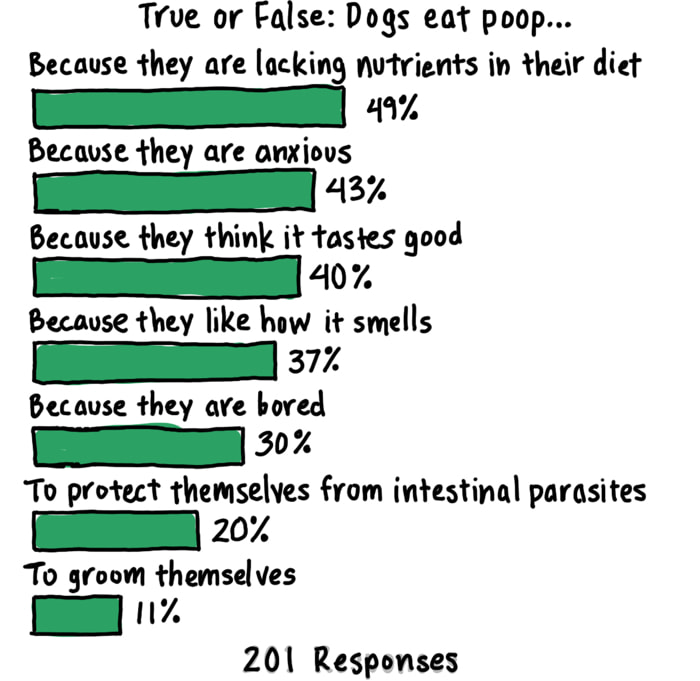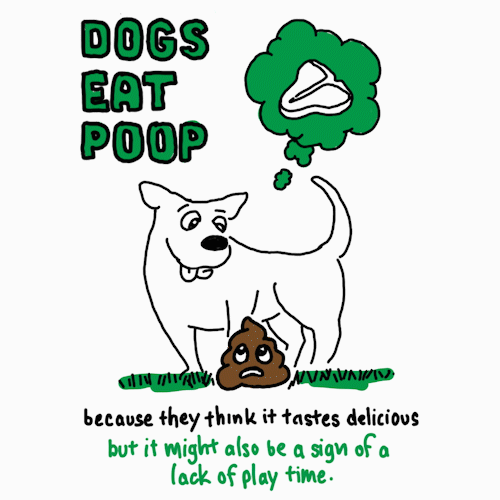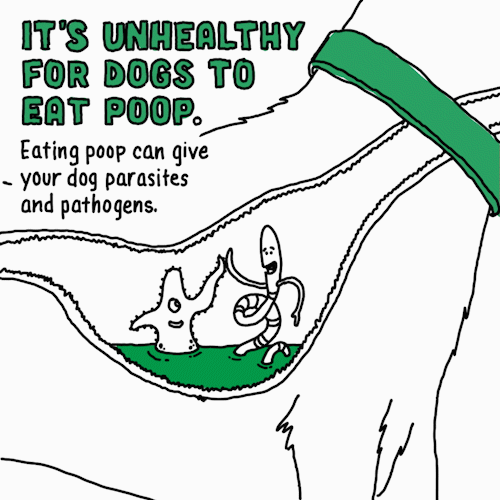

Like any companion or roommate, dogs — for all their love and cuteness—have habits we just don’t understand. One question dog owners often ask their pets: “Why? Why would you eat poop?”

When we polled* dog owners recently, most thought it was because a dog is lacking nutrients (49%), they’re anxious (43%) or they just think it tastes good (40%).
Dogs are significantly more likely to eat the droppings of another species (e.g., horses, rabbits) than their own.
We held our noses and got to the bottom of the issue with the help of some experts.
While those in our poll thought this was the number-one reason for the behavior, it has actually never been proven. “It’s a myth dogs eat poop because they’re seeking nutrients they aren’t getting. There’s no evidence to back this,” says
Opens a new windowDr. Jo Gale, BVetMed CertLAS MRCVS, Senior Manager, Global Science Advocacy at Waltham Petcare Science Institute.

According to Opens a new windowDr. Tammie King, Applied Behavior Technical Leader at Waltham Petcare Science Institute, “It can occur where there is lack of environmental enrichment. You see this often in dogs who are kenneled and have a lack of opportunity to exhibit normal canine behavior.” So if you need another excuse to get out and play with your pooch, this is a good one.
Believe it or not, this is the main reason dogs eat poop. Dr. Jo Gale explains: “Dogs are scavengers by nature and use any opportunity to eat what they can, when they can. They consider it a ‘tasty snack.’” Dr. Tammie King adds that “[Dogs eating poop] is a learned behavior. They’ve done it, enjoyed it, and that behavior is repeated.”
We love our dogs so much that we’re willing to trust our best friends on this. Maybe we should come out with a line of doggie breath mints though. Hmm.

“Ingesting feces from any animal increases potential for ingesting parasites and pathogens,” cautions Opens a new windowDr. James Serpell BSc, Phd Professor of Humane Ethics & Animal Welfare at University of Pennsylvania School of Veterinary Medicine. He went on to say, “[It’s] not something humans should ignore, but it's not worth getting too excited about it.”
All the experts we consulted said that if your dog occasionally eats poop, it’s nothing to be overly alarmed by. Just keep an eye on the frequency and their overall health. And as always, make sure they’re getting a nutritious diet and plenty of exercise and attention. If you have any concerns contact your vet.
Despite dogs liking the taste of poop, we’re going to stick with the healthy range of more traditional flavors offered in all IAMS dog foods.
*Surveyed U.S. dog owners, age 18+
Sample Size: n=201
Fielded May 8 to May 10, 2020


Deworming is the process of eliminating worms from the body, and it's an essential part of caring for your furry friend. Whether your puppy has already been diagnosed with worms or you simply want to take preventative measures, understanding how to deworm a puppy is crucial for their health and well-being.
But what exactly are worms, and how do puppies get them? Many types of worms can infect dogs, including roundworms, hookworms, whipworms, and tapeworms. These parasites are usually transmitted through contaminated soil, water, or food, and they can cause serious health problems if left untreated.
As a responsible pet parent, it's imperative to understand the process of deworming and how to keep your puppy safe and healthy. This blog will cover everything you need to know about deworming puppies, including the symptoms to look out for and the best ways to deworm your furry friend. Whether you are a new puppy parent or just looking to refresh your knowledge, this blog will provide the information you need to keep your pawfect pal worm-free.
Deworming your new pup is an indispensable part of adopting a dog. However, navigating the various deworming options and methods can be overwhelming. Here, we will uncover 4 must-knows to successfully deworming your puppy, including how often your puppy needs to be dewormed, the most effective treatment methods, and the importance of prevention. By understanding these key factors, you can ensure that your puppy remains happy and healthy, free from the discomfort and potential health risks caused by worms.
It's important to understand the importance of deworming your furry friend. This helps prevent the spread of worms and parasites, which can harm their health. Puppies need to be dewormed often due to their small size and underdeveloped immune systems.
According to experts, puppies should be dewormed every 2 weeks until 3 months of age and then every month until they are 6 months old. This helps to ensure that the worms are effectively eliminated from their system. It's also important to deworm pregnant dogs as they can pass worms on to their puppies in utero.
Along with deworming at regular intervals, good hygiene is essential to guarding against the spread of worms. Make sure you wash your hands after touching or playing with your puppy and clean up their waste immediately.
Overall, deworming is a crucial part of keeping your puppy healthy. Following a regular puppy deworming schedule and practising good hygiene can help protect your furry friend from harmful parasites.
Several worms can infect puppies, including roundworms, hookworms, whipworms, and tapeworms. These worms can cause various symptoms in puppies, including diarrhoea, vomiting, weight loss, and anaemia. It is important to deworm puppies regularly to prevent these worms from causing serious health problems.
Even if worms are not visible on your puppy, it does not mean they are not present. Some worms, such as tapeworms, can be challenging to detect because they are small and often pass through the stool in small pieces. Additionally, some worms can be present in the intestine without causing visible symptoms. Hence, follow a regular puppy deworming schedule and ensure that this four-legged angel is protected against these worms.
Worms in puppies can have many symptoms that can be difficult to spot, especially in young and small dogs. Common symptoms of worms in puppies include:
Deworming is especially important for puppies born to mothers who have worms, as they can be infected even before their birth. Following a proper deworming schedule and keeping an eye out for these symptoms can help keep your puppy healthy and happy. If you suspect your puppy has worms, it's important to take them to a veterinarian for treatment.
Worms are a common problem in puppies and can cause serious health issues if left untreated. The most common types of worms affecting puppies include roundworms, hookworms, and tapeworms. Symptoms of a worm infestation may include vomiting, diarrhoea, weight loss, and a pot-bellied appearance.
The good news is that worms are easily preventable and treatable in puppies. It's important to get your puppy on a regular deworming schedule, as recommended by your veterinarian. This will typically involve giving your puppy a deworming medication every few weeks until they reach a certain age. In addition, keeping your puppy's environment clean and preventing them from ingesting potentially contaminated objects can help prevent worms.
Suppose your puppy does end up with worms. In that case, your veterinarian will likely prescribe a deworming medication that can be given orally or through injection. It's important to follow the recommended treatment plan and continue the treatment for the entire prescribed course to ensure all the worms are eliminated.
Overall, it's important to be proactive in preventing and treating worms in puppies.


Deworming is the process of eliminating worms from the body, and it's an essential part of caring for your furry friend. Whether your puppy has already been diagnosed with worms or you simply want to take preventative measures, understanding how to deworm a puppy is crucial for their health and well-being.
But what exactly are worms, and how do puppies get them? Many types of worms can infect dogs, including roundworms, hookworms, whipworms, and tapeworms. These parasites are usually transmitted through contaminated soil, water, or food, and they can cause serious health problems if left untreated.
As a responsible pet parent, it's imperative to understand the process of deworming and how to keep your puppy safe and healthy. This blog will cover everything you need to know about deworming puppies, including the symptoms to look out for and the best ways to deworm your furry friend. Whether you are a new puppy parent or just looking to refresh your knowledge, this blog will provide the information you need to keep your pawfect pal worm-free.
Deworming your new pup is an indispensable part of adopting a dog. However, navigating the various deworming options and methods can be overwhelming. Here, we will uncover 4 must-knows to successfully deworming your puppy, including how often your puppy needs to be dewormed, the most effective treatment methods, and the importance of prevention. By understanding these key factors, you can ensure that your puppy remains happy and healthy, free from the discomfort and potential health risks caused by worms.
It's important to understand the importance of deworming your furry friend. This helps prevent the spread of worms and parasites, which can harm their health. Puppies need to be dewormed often due to their small size and underdeveloped immune systems.
According to experts, puppies should be dewormed every 2 weeks until 3 months of age and then every month until they are 6 months old. This helps to ensure that the worms are effectively eliminated from their system. It's also important to deworm pregnant dogs as they can pass worms on to their puppies in utero.
Along with deworming at regular intervals, good hygiene is essential to guarding against the spread of worms. Make sure you wash your hands after touching or playing with your puppy and clean up their waste immediately.
Overall, deworming is a crucial part of keeping your puppy healthy. Following a regular puppy deworming schedule and practising good hygiene can help protect your furry friend from harmful parasites.
Several worms can infect puppies, including roundworms, hookworms, whipworms, and tapeworms. These worms can cause various symptoms in puppies, including diarrhoea, vomiting, weight loss, and anaemia. It is important to deworm puppies regularly to prevent these worms from causing serious health problems.
Even if worms are not visible on your puppy, it does not mean they are not present. Some worms, such as tapeworms, can be challenging to detect because they are small and often pass through the stool in small pieces. Additionally, some worms can be present in the intestine without causing visible symptoms. Hence, follow a regular puppy deworming schedule and ensure that this four-legged angel is protected against these worms.
Worms in puppies can have many symptoms that can be difficult to spot, especially in young and small dogs. Common symptoms of worms in puppies include:
Deworming is especially important for puppies born to mothers who have worms, as they can be infected even before their birth. Following a proper deworming schedule and keeping an eye out for these symptoms can help keep your puppy healthy and happy. If you suspect your puppy has worms, it's important to take them to a veterinarian for treatment.
Worms are a common problem in puppies and can cause serious health issues if left untreated. The most common types of worms affecting puppies include roundworms, hookworms, and tapeworms. Symptoms of a worm infestation may include vomiting, diarrhoea, weight loss, and a pot-bellied appearance.
The good news is that worms are easily preventable and treatable in puppies. It's important to get your puppy on a regular deworming schedule, as recommended by your veterinarian. This will typically involve giving your puppy a deworming medication every few weeks until they reach a certain age. In addition, keeping your puppy's environment clean and preventing them from ingesting potentially contaminated objects can help prevent worms.
Suppose your puppy does end up with worms. In that case, your veterinarian will likely prescribe a deworming medication that can be given orally or through injection. It's important to follow the recommended treatment plan and continue the treatment for the entire prescribed course to ensure all the worms are eliminated.
Overall, it's important to be proactive in preventing and treating worms in puppies.